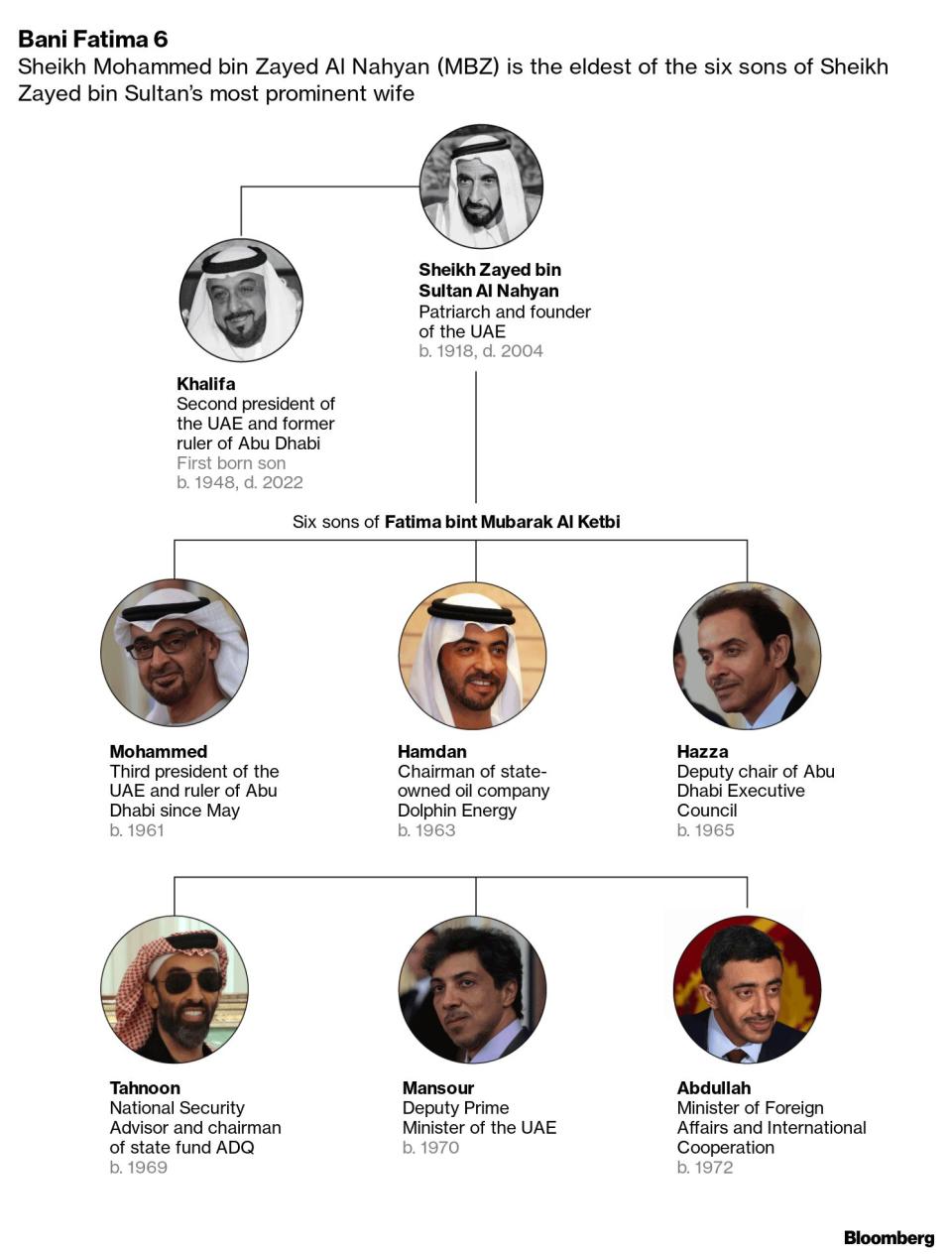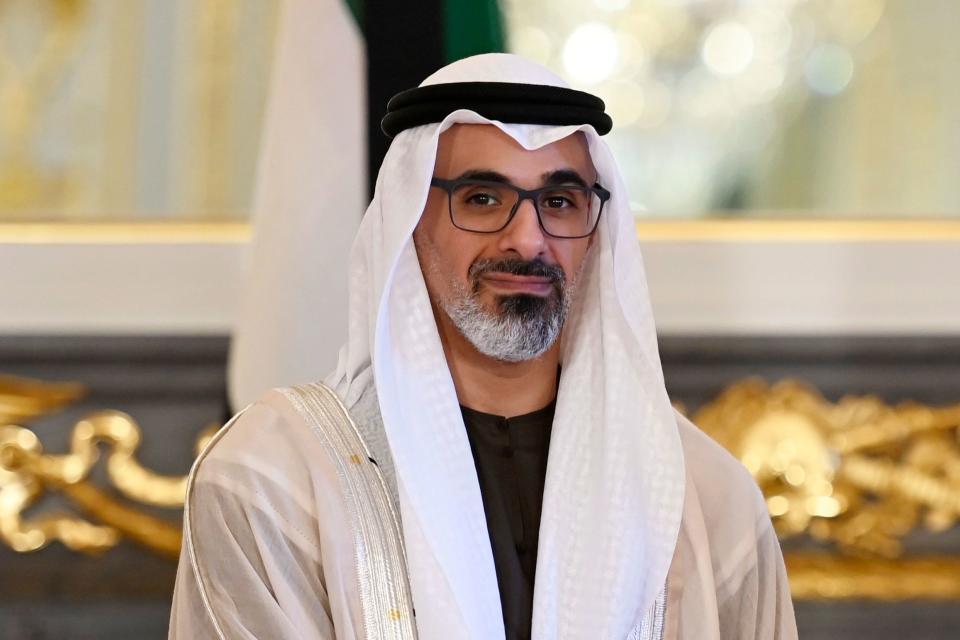UAE Ruler Names Son Crown Prince, Elevates Other Royals
- Oops!Something went wrong.Please try again later.
- Oops!Something went wrong.Please try again later.
(Bloomberg) -- The ruler of the United Arab Emirates named his son crown prince of Abu Dhabi, effectively positioning him as the next in line in the major OPEC oil exporter, and elevated several powerful brothers in a careful division of power.
Most Read from Bloomberg
Trump Faces Fingerprints, Mug Shots After Historic Indictment
$335,000 Pay for ‘AI Whisperer’ Jobs Appears in Red-Hot Market
A $3 Trillion Threat to Global Financial Markets Looms in Japan
The UAE’s 62-year-old ruler Sheikh Mohammed bin Zayed, chose his eldest son Sheikh Khaled bin Mohammed bin Zayed Al Nahyan, 43, as crown prince. He’s been groomed for leadership through his membership of the powerful Abu Dhabi Executive Council and the main national security body since 2016.
Sheikh Khaled “has been empowered in numerous positions that give him leadership experience in oil, the economy, and governance,” said Kristin Smith Diwan, senior resident scholar at the Arab Gulf States Institute in Washington.
“It definitely would fit with the pattern of both greater state centralization and vertical consolidation of ruling lines that we have seen within the Gulf monarchies,” she said.
The Al Nahyan ruling family is among the world’s richest, with a net worth of at least $300 billion, according to an analysis of their complex holdings by the Bloomberg Billionaires Index. The UAE is home to about 6% of the world’s proven oil reserves and some of the largest sovereign wealth funds.
Leader-in-Waiting
In the Gulf region, power can transition through brothers, cousins and sons. The elevation of a son rather than a brother is a generational shift previously seen in Saudi Arabia with the rise to power of crown prince Mohammed bin Salman, who bypassed more senior ruling family members in a move that broke with precedent in the kingdom.
In the UAE, the shift is less unusual and was widely expected.
Sheikh Khaled is now leader-in-waiting of a Gulf Arab state that has used its geopolitical clout to intervene in regional conflicts, ease frictions with Iran and walk a diplomatic tightrope over Russia’s invasion of Ukraine thanks to its close ties with both Moscow and Washington.
“The set of decrees are a master stroke because they simply settle different files at once, pleasing concerned parties,” Bader Al-Saif, an assistant professor of history at Kuwait University, wrote on Twitter.
The naming of his son provides for more stability and smoother succession and will allow the crown prince to be closer in age to the majority of population, he added.
Powerful Siblings
The UAE ruler also promoted powerful siblings, effectively expanding their responsibilities and portfolios. Sheikh Tahnoon bin Zayed, currently the UAE’s national security adviser, and Sheikh Hazza were named deputy rulers of Abu Dhabi.
Sheikh Tahnoon was recently appointed chairman of Abu Dhabi’s $790 billion sovereign wealth fund Abu Dhabi Investment Authority. His low-key public profile belies a deep influence behind the scenes — he’s helped forge the UAE’s security policy and is a gateway to Abu Dhabi business, making him top on the list for meetings of visiting foreign officials and executives.
Sheikh Mansour bin Zayed was named the UAE’s vice president, a role also held by Dubai’s ruler Sheikh Mohammed bin Rashid. Outside the UAE, he’s known for being the owner of Manchester City Football Club. He is also chairman of the central bank and Mubadala Investment Co., and sits on the boards of several UAE-based firms.
MBZ and his siblings — a group of six brothers, known as the Bani Fatima — are all sons of UAE founder Sheikh Zayed bin Sultan Al Nahyan from his third and most prominent wife.
The new crown prince, Sheikh Khaled, has also had an important role within the security establishment and has led an interest in information technology where he focused on luring and nurturing talent in the sector. He’s now also the head of Abu Dhabi’s executive office, the supervisory body in the emirate’s government.
He’s part of a generation that will have to work on maintaining the UAE’s position as the Middle East’s business and tourism hub amid intensifying competition from Saudi Arabia, as well as continuing the UAE’s energy transition and meet its 2050 net zero target — the first announced by a major Gulf crude producer.
(Adds context throughout, comment in paragraphs 9-10)
Most Read from Bloomberg Businessweek
John Wick’s Blowout Opening Lifts Lions Gate, But It Won’t Fix Starz
College Students Are About to Put a Robot on the Moon Before NASA
SVB’s Collapse Shows the World’s Favorite Safe Asset Isn’t Risk-Free
©2023 Bloomberg L.P.



